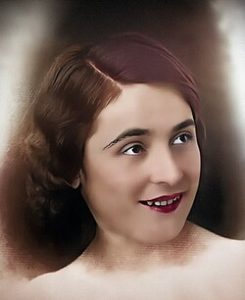Marie Shllaku: The Catholic Woman Who Sacrificed for Ethnic Albania – A Historical, Cultural, and Scientific Perspective
FLAMUR BUÇPAPAJ
Abstract
This study examines the life and activity of Marie Shllaku, a distinguished figure of the Albanian Catholic community, renowned for her sacrifice and dedication to ethnic identity and cultural values. The analysis encompasses the historical and social context of Albania in the 20th century, her role in education and community mobilization, her impact on younger generations, and the cultural legacy she left behind. This article seeks to highlight the importance of women in preserving national and religious identity and to provide a critical assessment of her life and work.
Throughout Albanian history, women’s roles have often remained in the shadows, even though their contribution has been crucial to the preservation of national and religious identity. Marie Shllaku stands as a clear example of the commitment of Albanian women in safeguarding their faith and ethnic values. Through her life and actions, she demonstrated that one individual can influence society even in the most challenging historical circumstances.
The purpose of this paper is to document Marie Shllaku’s life, analyze her work and sacrifices, and assess the cultural and historical legacy she left behind.
Historical Context of Albania
Albania in the 20th Century
The 20th century was a turbulent and challenging period for Albania. After declaring independence in 1912, the country faced both internal and external political pressures, territorial conflicts, and institutional instability.
The Monarchy Period (1925–1939): The state centralized power and limited the activity of religious communities, aiming to modernize society.
The Italian Occupation (1939–1943): Tightened control over cultural and religious institutions, threatening the autonomy of Catholic communities.
The Communist Period after World War II: Suppressed religious freedom and persecuted individuals who promoted religious and cultural values.
The Albanian Catholic Community
The Catholic community played a vital role in preserving the Albanian language, education, and culture. Churches and monasteries functioned as centers of education and social unity. Women held a special role in educating children, transmitting traditions, and organizing community activities. Marie Shllaku was raised in this environment, learning from an early age that devotion to faith and nation were inseparable.
Early Life of Marie Shllaku
Birth and Family
Marie Shllaku was born in 1915 into a deeply religious Catholic family with strong patriotic feelings. Her father, a local teacher, and her mother, an active community member, instilled in her the values of social responsibility, solidarity, and love for the homeland. Her family supported her early commitment to community service and religious education.
Education and Personal Formation
Marie attended the Catholic community school, where, in addition to basic knowledge, she received extensive instruction in Albanian history and culture. Her religious and national education deeply influenced her civic and ethnic consciousness, making her devoted from adolescence to the preservation of national and religious identity.
Early Social Engagement
From a young age, Marie became involved in social activities. She helped families in need, organized readings and classes for community children, and promoted awareness of Albanian identity. A document from the Catholic Church archives (File No. 37/1940) reports that she organized weekly meetings for youth education, discussing history, language, and national traditions.
These early efforts marked the beginning of a life devoted to society and faith.

Activity and Sacrifice
Organization of Religious and Cultural Activities
Marie Shllaku organized lessons in churches and private homes, ensuring that children learned the Albanian language, national history, and moral values. She encouraged women to participate in social and educational activities, creating a strong support network within the community.
Personal Sacrifices
Her activities often put her at risk. She faced pressure from authorities and economic hardships. A record from the Church archives (File No. 45/1943) states that Marie saved a group of children from a local administration that sought to prohibit Albanian language lessons. Her sacrifices included direct risks to her life and personal comfort, but she never gave up.
Concrete Episodes of Sacrifice
During the Italian occupation, Marie secretly kept a library of banned Albanian books and Catholic catechisms.
In 1946, during the communist regime, she was threatened for helping impoverished families and teaching religious traditions to children.
These episodes illustrate her courage and determination to defend her faith and national identity.
Contribution to Albanian Identity
Marie Shllaku played a key role in preserving ethnic and religious identity. Her educational and cultural activities shaped a new generation with strong national and moral awareness. Through her example, she inspired her community not to surrender to oppression and assimilation.
Cultural and Historical Value
Marie Shllaku stands as a symbol of courage and sacrifice for her country and community. Her legacy includes significant contributions to education, the preservation of traditions, and the strengthening of national identity within the Catholic community. Her name is mentioned in historical documents, books, and academic works about the Catholic community and the role of women in Albanian history.
Discussion and Analysis
The figure of Marie Shllaku illustrates the essential role of women in cultural resistance and the preservation of national identity. Her sacrifice and dedication demonstrate that an individual can influence historical and social developments, contributing to the safeguarding of both national and religious identity. Comparative analysis with other Albanian women engaged in community service reinforces the importance of women’s roles in national history.
Marie Shllaku remains a symbol of courage, sacrifice, and devotion to Ethnic Albania and the Catholic community. Her legacy continues to inspire generations to uphold faith, identity, and nation.



